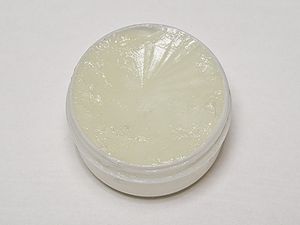- Moisturizer
-
Moisturizers or emollients /ɨˈmɒliənts/ are complex mixtures of chemical agents specially designed to make the external layers of the skin (epidermis) softer and more pliable, by increasing its hydration (water content) by reducing evaporation. Naturally occurring skin lipids and sterols as well as artificial or natural oils, humectants, emollients, lubricants, etc. may be part of the composition of commercial skin moisturizers. They usually are available as commercial products for cosmetic and therapeutic uses, but can also be made at home using common pharmacy ingredients.
Contents
By indication
Moisturizers prevent and treat dry skin, protect sensitive skin, improve skin tone and texture, and mask imperfections.[1]
Preservation of normal skin
Moisturizers can be used to prevent the skin from becoming too dry or oily, such as with light, nongreasy water-based moisturizers. Such moisturizers often contain lightweight oils, such as cetyl alcohol, or silicone-derived ingredients, such as cyclomethicone.[1]
Dry skin
For treating skin dryness, the most appropriate moisturizers are heavier, oil-based moisturizers that contain ingredients such as antioxidants, grape seed oil or dimethicone.[1] For very dry, cracked skin, petrolatum-based products are preferable, as they are more lasting than creams and are more effective in preventing water evaporation.[1]
Oily skin
In oily skin, moisturizers can still be useful after activities causing skin dryness, such as other skin care products and washing.[1] For oily skin, water-based moisturizers that are specifically noncomedogenic are preferable, as there is less risk of comedo formation.[1]
Aging skin
Appropriate moisturizers to keep aging skin soft and well hydrated are oil-based ones that contain petrolatum as the base, along with antioxidants or alpha hydroxy acids against wrinkles.[1]
Sensitive skin
On sensitive skin (which otherwise is susceptible to skin irritations, redness, itching or rashes), it is preferable with moisturizers that contain soothing ingredients such as chamomile or aloe and that minimize potential allergens such as fragrances or dyes, as well as irritants such as acids.[1]
Eczema
In eczema it is generally best to match thicker ointments to the driest, flakiest skin. Light emollients like aqueous cream may not have any effect on severely dry skin. Some common emollients for the relief of eczema include Oilatum, Balneum, Medi Oil, Diprobase, bath oils and aqueous cream. Sebexol, Epaderm ointment, Exederm and Eucerin lotion or cream may also be helpful with itching. Lotions or creams may be applied directly to the skin after bathing to lock in moisture. Moisturizing gloves (gloves which keep emollients in contact with skin on the hands) can be worn while sleeping. Generally, twice-daily applications of emollients work best. While creams are easy to apply, they are quickly absorbed into the skin, and therefore need frequent reapplication. Ointments, with less water content, stay on the skin for longer and need fewer applications, but they can be greasy and inconvenient.
Recently, ceramides, which are the major lipid constituent of the stratum corneum, have been used in the treatment of eczema.[2][3][4] They are often one of the ingredients of modern moisturizers. These lipids were also successfully produced synthetically in the laboratory.[5]
Mechanisms of action
There are three methods used to moisturize skin[6]:
- Occlusives: These work by forming a thin film on the surface of the skin to prevent any loss of moisture.
- Humectants: These attract water from the air in order to moisturize the skin.
- Restoration of Deficient Materials: These are more complex and try to restore natural moisturizing factors on the skin such as amino-lipids.
Risks of moisturizers
Two factors have to be considered when assessing the safety of a moisturizer:
- The safety of the ingredients it contains. There are on-line databases like Skin Deep where consumers can get information about individual cosmetic ingredients.[7]
- The risk of bacterial contamination.
A recent study discovered that the application of certain moisturizers increases the incidence of skin cancer in high-risk mice. Note: these animals were subjected to UVB radiation in high doses over a long period of time prior to application of moisturizers.[8] Four popular moisturizers were tested, providing the same result. It is not yet known if the same applies to humans. A fifth moisturizer, specially prepared without mineral oil and sodium lauryl sulphate, had no such effect.[9] The researchers asked Johnson & Johnson to produce this cream for the study, which the pharmaceutical company later patented.
Some people are sensitive or allergic to certain chemical components, which can cause irritation, rashes, and other allergic reactions.
As with most skin-care products, there is a risk of moisturizers being contaminated with bacteria that can cause disease.
References
- ^ a b c d e f g h Mayo Clinic: Moisturizers: Options for softer skin Dec. 16, 2010
- ^ Coderch L, López O, de la Maza A, Parra JL (2003). "Ceramides and skin function". American Journal of Clinical Dermatology 4 (2): 107–29. doi:10.2165/00128071-200304020-00004. PMID 12553851.
- ^ Bouwstra JA, Ponec M (December 2006). "The skin barrier in healthy and diseased state". Biochimica et Biophysica Acta 1758 (12): 2080–95. doi:10.1016/j.bbamem.2006.06.021. PMID 16945325.
- ^ Choi MJ, Maibach HI (2005). "Role of ceramides in barrier function of healthy and diseased skin". American Journal of Clinical Dermatology 6 (4): 215–23. doi:10.2165/00128071-200506040-00002. PMID 16060709.
- ^ "New Skin-healing Chemicals". Science Daily. August 30, 2007. http://www.sciencedaily.com/releases/2007/08/070827184713.htm. Retrieved 2007-10-06.
- ^ Moisturizers | The Ageing Skin
- ^ http://www.cosmeticsdatabase.com/
- ^ http://www.nature.com/jid/journal/vaop/ncurrent/abs/jid2008241a.html
- ^ http://blogs.nature.com/news/thegreatbeyond/2008/08/link_between_skin_cancer_and_m.html
External links
Categories:- Medicine stubs
- Skin care
Wikimedia Foundation. 2010.

